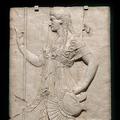033 Pronomina - alius, alter. Apis et homo
|autre|l'autre|abeille|et|homme
|another|other|bee||
033 Pronomen - noch eins, noch eins Die Biene und der Mann
033 Pronouns - another, another The bee and the man
033 Pronombres - otro, otro la abeja y el hombre
033 Pronomi: un altro, un altro L'ape e l'uomo
033 代名詞 - 別の者、他の者。蜂と人間
033 Voornaamwoorden - nog een, nog een De bij en de man
033 Pronomes - outro, outro A abelha e o homem
033 Займенники – інший, інший Бджола і людина
033 代词 - 另一个,另一个蜜蜂和人
033 Pronoms - autre, autre. Abeille et homme
Unius viri consilio, Themistoclis, anno ante Christum natum quadringentesimo octogesimo tota Graecia servata est.
d'un|homme|conseil|de Thémistocle|année|avant|Christ|né|quatre centième|quatre-vingtième|toute|Grèce|sauvée|est
||plan|Themistocles|in the year||Christ||four hundred|eighty-first|all||was saved|
||||||||四百八十|||||
|||||antes de Cristo||||||Toda Grecia||
All Greece was saved by the advice of one man, Themistocles, who was born four hundred and eighty in the year before Christ.
一人の男の計画、テミストクレスによって、紀元前480年に全ギリシャが守られました。
За порадою однієї людини, Фемістокла, в чотириста вісімдесятому році до нашої ери вся Греція була врятована.
Par le conseil d'un seul homme, celui de Thémistocle, l'année quatre cent quatre-vingt avant la naissance du Christ, toute la Grèce a été sauvée.
Ante bellum Helvetiorum Caesar provinciae toti quam maximum militum numerum imperavit.
Avant|guerre|des Helvètes|César|province|à tout|que|le plus grand|de soldats|nombre|ordonna
||||of the province|to the whole of|||||ordered
||||州||||||
Before the war with the Helvetii, Caesar commanded the greatest number of soldiers in the whole province.
ヘルヴェティ氏族の戦争前に、カエサルは全省にできるだけ多くの兵士の数を命じました。
Перед війною з гельветами Цезар командував найбільшою кількістю солдатів у всій провінції.
Avant la guerre des Helvètes, César a ordonné le plus grand nombre de soldats pour toute la province.
Caesaris aetate Galliae totius factiones erant duae; harum alterius principes erant Aedui, alterius Arverni.
de César|époque|de la Gaule|de tout|factions|étaient|deux|de celles-ci|de l'autre|chefs|étaient|les Éduens|de l'autre|les Arvernes
||of Gaul|of all Gaul|factions||two|of these|one|leaders||the Aedui|of the other|Arverni tribe
||||||二つの|||||||
de César|en la época|de la Galia|||eran|dos|||líderes||||Arvernos
In the age of Caesar there were two factions in the whole of Gaul; the leaders of one of these were the Aedui, of the other Arverni.
カエサルの時代、ガリア全土には二つの派閥があった。そのうちの一つの指導者はエドゥイ族、もう一つはアルウェルニ族であった。
À l'époque de César, il y avait deux factions dans toute la Gaule ; les chefs de l'une étaient les Éduens, ceux de l'autre les Arvernes.
Noxii ambo alter alterum accusant.
Les noces|tous les deux|l'un|l'autre|accusent
the guilty|both|one|the other|accuse
被告人||||
Both accuse each other of harm.
二人は互いに互いを告発している。
Tous deux se blâment l'un l'autre.
Cui fortuna alterius nimis placet, sua saepe displicet.
À qui|fortune|d'autrui|trop|plaît|sa propre|souvent|déplaît
|||||||displeases
|||||||不満を持つ
He who likes another's fortune too much, often dislikes his own.
他者の運があまりにも好まれる人は、しばしば自分の運が好まれない。
À celui dont la fortune plaît trop à un autre, la sienne déplaît souvent.
Populus Romanus viciis non ad alterius praeceptum, sed ad suum arbitrium imperabat.
Le peuple|romain|vices|ne|à|d'un autre|commandement|mais|à|son|arbitre|commandait
|Roman|vices|||another's|precept of another||||own discretion|commanded
||||||||||判断|命令していた
The Roman people ruled by vice, not at the command of another, but at their own discretion.
ローマ人は他人の指示によるのではなく、自分の判断で支配していた。
Le peuple romain ne commandait pas selon le précepte d'un autre, mais selon son propre jugement.
Alii aliud placet.
Certains|autre|plaisent
others|another|
Others like something else.
人々はそれぞれ別のことが好きだ。
À chacun son goût.
Homines alius alium adiuvare debet.
Les hommes|l'un|l'autre|aider|doivent
|another|another|help each other|should
|||助け合う|
People should help each other.
人は互いに助け合わなければならない。
Les hommes doivent s'entraider.
Parentibus nihil aliud maiori curae est quam salus liberorum.
aux parents|rien|d'autre|plus grande|souci|est|que|santé|des enfants
|||greater|concern|||safety|of the children
|||大きな|||||
There is nothing more important to parents than the safety of their children.
親にとって、子供の安全以上に大切なことは何もない。
Pour les parents, rien n'est plus important que la santé de leurs enfants.
Non sibi soli homo natus est sed etiam alteris.
Non|à soi|seul|homme|né|est|mais|aussi|aux autres
||for himself||||||others
||||||||他者に
Man was born not only for himself, but also for others.
人は自分だけのために生まれたのではなく、他の人のためでもある。
L'homme n'est pas né seulement pour lui-même mais aussi pour les autres.
"Apis et homo"
Abeille|et|homme
"The Bee and the Man"
「蜂と人間」
"Abeille et homme"
Est tibi ulla inter bestias amicior quam ego?
Est|à toi|aucune|parmi|bêtes|plus amicale|que|moi
||||beasts|friendlier||
||any||獣たち|||
||||||más que yo|
Is there any animal more friendly to you than I?
あなたにとって、獣の中で私ほど親しい者はいますか?
Y a-t-il parmi les bêtes un ami plus proche que moi?
apis hominem interrogat.
l'abeille|homme|interroge
||questions
||尋ねる
La abeja||
the bee asks the man.
蜂が人間に尋ねる。
L'abeille interroge l'homme.
Est, hic adfirmat.
Il est|ici|affirme
||he affirms
||ここに主張する
It is, he affirms here.
はい、ここで主張しています。
Oui, il l'affirme.
Et quis?
Et|qui
And who?
¿Y quien?
そして誰?
Et qui?
Ovis.
Mouton
ove
The sheep.
羊。
Mouton.
Lana enim eius mihi necessaria est, mel tuum gratum.
Laine|en effet|son|à moi|nécessaire|est|miel|ton|agréable
Lana is||||||||pleasing
ラナ||||||||
For its wool is necessary for me, your honey is pleasing.
彼女の毛は私にとって必要であり、あなたの蜜は感謝される。
Sa laine m'est nécessaire, ton miel est apprécié.
Et ovis lanam suam mihi sine negotio dat; at ubi tu mihi mel tuum donas, aculeus tuus mihi periculum parat.
Et|brebis|laine|sa|à moi|sans|effort|donne|mais|où|tu|à moi|miel|ton|donnes|aiguillon|ton|à moi|danger|prépare
||wool|her|||trouble||||||||you give|sting|||danger|
|||||||||||||||針||||
And the sheep gives me its wool without any trouble; but when you give me your honey, your sting prepares danger for me.
羊は私に面倒なく自分の毛を与えてくれる。しかし、あなたが私にあなたの蜜を贈るとき、あなたの針は私に危険をもたらす。
Et le mouton me donne sa laine sans problème; mais quand tu me donnes ton miel, ta piqûre me prépare un danger.
SENT_CWT:AFkKFwvL=3.46 PAR_TRANS:gpt-4o-mini=3.2
fr:AFkKFwvL
openai.2025-01-22
ai_request(all=23 err=0.00%) translation(all=19 err=0.00%) cwt(all=145 err=0.69%)

